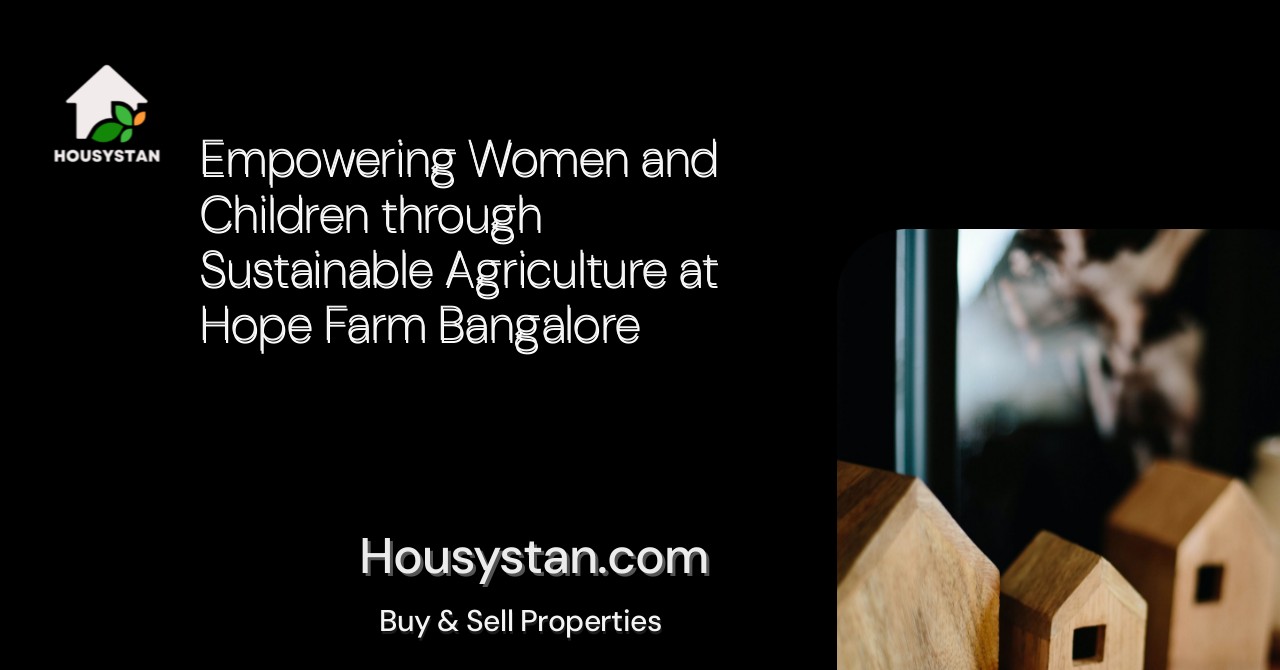Empowering Women and Children through Sustainable Agriculture at Hope Farm Bangalore
Read latest blogs and articles from Housystan

The Information mentioned here was last updated on:
17/1/2026Empowering Women and Children through Sustainable Agriculture at Hope Farm Bangalore
In the sprawling city of Bangalore, where modernity and tradition coexist, an inspiring movement is blossoming. At the heart of this movement lies Hope Farm, a sanctuary dedicated to empowering women and children through sustainable agriculture. This initiative not only fosters economic independence but also promotes environmental stewardship and community development. Let’s delve into the facets of this remarkable endeavor and understand how it is reshaping lives and landscapes.
The Vision Behind Hope Farm
- Verified Tenants/Buyers
- Unlimited Property Listing
- Zero subscription/charges fee
Hope Farm is not just a piece of land; it is a vision for a sustainable and equitable future. The farm was established with the core aim of providing women and children the tools and knowledge necessary to thrive. By focusing on sustainable agriculture, Hope Farm offers a dual benefit: creating economic opportunities and promoting ecological sustainability.
A Safe Space for Women and Children
For many women and children in Bangalore, Hope Farm symbolizes a safe space where they can learn, grow, and earn. It's a place where women are trained in agriculture skills, including organic farming techniques, crop management, and sustainable practices that are crucial for maintaining the health of the land. Through these training sessions, women gain the confidence and knowledge needed to manage their own plots of land or contribute significantly to local agricultural efforts.
Sustainable Agriculture as a Catalyst
Sustainable agriculture stands as the centerpiece of Hope Farm’s initiatives. But what exactly does sustainable agriculture mean in this context? It refers to farming practices that are environmentally sound, economically viable, and socially responsible. At Hope Farm, this means using organic methods that avoid harmful chemicals, rotating crops to maintain soil health, and employing water conservation techniques.
Organic Farming Techniques
Organic farming at Hope Farm emphasizes the use of natural fertilizers and pest control methods. Composting is one such technique that is taught and practiced widely. Organic compost not only enriches the soil but also reduces waste, providing a sustainable cycle of nourishment for the crops. For pest control, the farm uses methods such as companion planting, where certain plants naturally deter pests from one another.
Crop Diversity and Rotation
Another key aspect of sustainable agriculture at Hope Farm is crop diversity and rotation. By cultivating a variety of crops, the farm mitigates risks such as market fluctuations and climate changes. Crop rotation, on the other hand, ensures that different nutrients are replenished in the soil throughout the year, which prevents soil depletion and reduces the need for synthetic fertilizers.
Economic Empowerment Through Agriculture
For the women involved, the economic empowerment facilitated by Hope Farm is transformative. By learning to grow and sell their produce, these women gain financial independence and are better equipped to support their families. The farm helps create market linkages so that participants can sell their produce directly to consumers, ensuring they receive fair prices and increase their profit margins.
Training and Skill Development
At the core of this economic empowerment is comprehensive training. Hope Farm conducts workshops and skill development programs that cover a broad range of topics, from planting techniques to marketing strategies. This training ensures that participants not only know how to grow crops but also how to manage their small businesses effectively.
Creating Entrepreneurial Opportunities
The holistic approach of Hope Farm opens up entrepreneurial opportunities as well. Several women have gone on to establish their own small enterprises, selling farm produce, handmade crafts, or organic products. These businesses not only sustain individual families but also contribute economically to the broader community.
Environmental Stewardship
Beyond economic benefits, Hope Farm instills a profound understanding of environmental stewardship. The farm teaches future generations the importance of living in harmony with nature and using resources wisely. This mindset shift is crucial for fostering long-term sustainable practices.
Water Conservation Efforts
Given that water is a precious resource, Hope Farm places a strong emphasis on water conservation. Techniques such as rainwater harvesting and drip irrigation are standard practices here. These methods not only reduce water usage but also ensure that crops receive adequate hydration, illustrating a balance between conservation and productivity.
Biodiversity Support
The farm also promotes biodiversity by nurturing a wide variety of plant species and creating habitats for beneficial wildlife. This biodiversity supports pollination and natural pest control, reducing the need for chemical interventions. It also ensures ecosystem health, which is vital for the resilience of agricultural systems.
Community Building and Support Networks
Hope Farm is more than just an agricultural project; it is a network of community support. Participants form strong bonds and support each other through various challenges, both personal and professional. This sense of community is a powerful motivator that encourages continuous learning and development.
Educational Programs for Children
By involving children in farm activities, Hope Farm ensures that the next generation appreciates the value of sustainable agriculture. Educational programs tailored for young participants include hands-on gardening workshops and environmental awareness activities. These programs cultivate a sense of responsibility and connection to the land that lasts a lifetime.
A Model for Replication
The success story of Hope Farm is gradually becoming a model for replication. Other communities and organizations can draw valuable lessons from this initiative to implement similar programs elsewhere. By sharing resources and knowledge, Hope Farm is amplifying its impact beyond the boundaries of Bangalore.
Conclusion
Hope Farm Bangalore stands as a beacon of empowerment and sustainability. By integrating women and children into the realm of sustainable agriculture, it creates a ripple effect of economic independence, environmental consciousness, and community cohesion. This initiative not only transforms the participants’ lives but also plants the seeds for a more sustainable and inclusive future—one where hope indeed thrives.